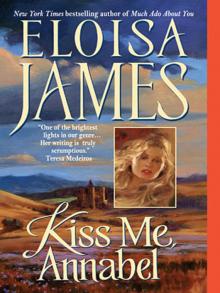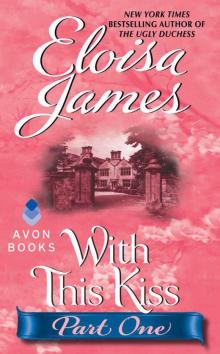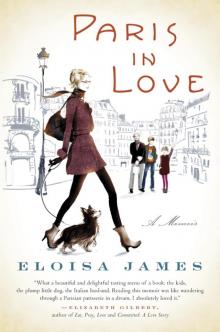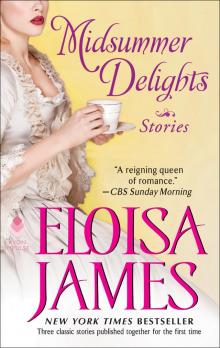Mistletoe Christmas, page 1





Contents
Cover
Title Page
A Mistletoe Kiss Prologue
Chapter One
Chapter Two
Chapter Three
Chapter Four
Chapter Five
Chapter Six
Chapter Seven
Chapter Eight
Chapter Nine
Chapter Ten
Chapter Eleven
Chapter Twelve
Chapter Thirteen
About Eloisa James
Wishing Under the Mistletoe Prologue
Chapter One
Chapter Two
Chapter Three
Chapter Four
Chapter Five
Chapter Six
Chapter Seven
Chapter Eight
Chapter Nine
Chapter Ten
Chapter Eleven
About Christi Caldwell
Compromise Under the Mistletoe Chapter One
Chapter Two
Chapter Three
Chapter Four
Chapter Five
Chapter Six
Chapter Seven
Chapter Eight
Chapter Nine
Chapter Ten
Chapter Eleven
Epilogue
About Janna MacGregor
Mischief & Mistletoe Chapter One
Chapter Two
Chapter Three
Chapter Four
Chapter Five
Chapter Six
Chapter Seven
Chapter Eight
Chapter Nine
Chapter Ten
Chapter Eleven
Chapter Twelve
Chapter Thirteen
Chapter Fourteen
Chapter Fifteen
Chapter Sixteen
Epilogue
About Erica Ridley
Also by the Authors
Copyright
About the Publisher
A Mistletoe Kiss
by Eloisa James
Prologue
Lady Elizabeth Childe to her American cousin, Mrs. Sarah Darby
November 25, 1815
My dearest Sarah,
I’m so thrilled to tell you that after years of hoping, Lord Childe and I have finally received an invitation to the Duke of Greystoke’s Revelry! ’Tis a magnificent Christmastide house party featuring every amusement and wonder. I’ve heard there are plays, dancing, a magical grotto . . . His Grace has a genius for bringing together the finest in England: the aristocracy mingles with artists, politicians, commoners—even journalists and opera dancers!
As you can imagine, such a Revelry does lend itself to scandalous behavior. For mothers, though, it’s as important as the Season: a girl who has failed to attract a husband might find success in its less formal atmosphere. We shan’t discover the other names on the guest list until it is printed in the Morning Chronicle.
My husband grumps that Greystoke thinks too highly of his party, but the Revelry has been labeled a cornerstone of British society. Now that the duke is on his deathbed, though, no one knows what will happen next year. If this is to be the final gathering, I’ve no doubt it will be a Revelry to remember.
On a topic closer to home, you would be thrilled by my hothouse peonies . . .
Chapter One
The Duke of Greystoke’s annual Christmas Revelry
Greystoke Manor, Cheshire
December, 1815
The Duke of Greystoke would likely be dead by Epiphany, but he counted that as a triumph.
“Only a week left in the Revelry . . . I’ll make it to the end, won’t I?” He gasped for breath because his heart no longer supported bold statements. Back in the fall, his doctors had advised him he’d be gone by All Hallows. “Proved them wrong. Made it to my party,” he added.
His youngest daughter, Lady Cressida—known to most as Cressie—said, “So you did, Father.” She was seated at her father’s bedside, pretending to listen dutifully, but actually scribbling a list of niggling problems springing from the presence of so many guests in the manor.
“Going well, isn’t it?” The duke had only come downstairs once since the house party began a week ago, but sounds of raucous cheer had filtered to his bedchamber, and he’d entertained a stream of visitors.
“Yes, indeed. The cast has arrived for the pantomime, and Isabelle is working with them.”
“Isabelle?” the duke asked uncertainly.
“Your granddaughter, Lady Isabelle Wilkshire,” Cressie said.
“That’s right. Never married, obsessed by the theater. Unsuitable, very.” He nodded, satisfied. “What else?”
“The Prime Minister told me in confidence that he is feeling much better about the outcome of the farm bill in Lords.”
Her father scoffed. “Nothing more exciting?”
“The lead opera singer at the Theater Royal had chosen Lord Bennett as her new protector,” Cressie offered. “Last night Lady Bennett tossed a cup of mulled wine at his head.”
“That’s more like it,” the duke said, smiling. “Wouldn’t be the Revelry without scandal.”
There were seven days to go in the duke’s annual Christmas festivity—if His Grace’s death didn’t cut the party short. Cressie was fairly certain that her father would refuse to accompany the Grim Reaper until the last carriage had rolled away.
“The Revelry must go on,” the duke said, as if he heard her thought. “We’ve only missed the one year, when your mother passed. We must have at least another decade! Damn it, Cressie, he has to carry on my legacy.”
He was the duke’s heir.
The Duke of Greystoke and his wife had been blessed with five daughters but no heir, a tragedy underscored by the death of his brother. The title and estate would devolve to his nephew, Valentine Snowe, Viscount Derham.
Valentine, or Val to his family, was pleasant enough, although Cressie had to admit that she scarcely knew him. He dutifully attended the Christmas Revelry on the express command of the duke, but he eschewed the ballroom and closeted himself with a group of men as reclusive and rakish as he.
“A few months ago, Val had the gall to tell me that he wouldn’t carry on with the Revelry,” the duke barked.
Cressie didn’t think that Val could carry on. The truth was that the work of throwing the complicated series of parties and events that made up the annual Revelry was hers. For more than a decade, she had created the invitation list and designed all the elaborate entertainments.
Yet much as she had enjoyed the creative license her father had given her, she wanted to do something else with her life. She longed for a house of her own, and someday a family, rather than an existence consumed by an annual party.
“Changed his tune now,” the duke said, his voice triumphant.
“How did you do that, Father?” Cressie asked.
“I made him an offer he can’t refuse.”
“Indeed?” Cressie murmured, wondering if she should turn the evening’s quartet into a trio. One violinist hadn’t made an appearance.
“I am giving him the Scottish estate,” her father announced, darting a glance at Cressie. “For foolishly sentimental reasons, he wants that estate. But I told him that he couldn’t have it unless he swore to hold the Revelry for the next decade.”
Cressie straightened and her heart gave a sickening thump. The list slid from her hands to the floor. The Scottish estate had long been promised as her dowry, or if she didn’t marry, a place for her to live once the ducal estate passed out of her father’s hands.
“Pick that up!” her father ordered. “You’re always dropping things.”
Cressie’s stomach clenched into a knot. She loved designing and running the enormous machinery of the Revelry. But she didn’t want it to be her life’s work.
“Why should you mind?” her father demanded. “The Revelry is my legacy, all I leave behind, since I had no sons.” He didn’t meet her eyes, because he knew perfectly well how unfair he was being.
“I do mind,” Cressie said hotly, bending over to grab the list.
“I’ll make Val promise to take care of you. He has to take care of you because you’re key to the whole thing.”
“I refuse to be that key!” Cressie retorted, springing to her feet. “You presuppose I will agree to continuing the work involved in the Revelry—and I will not! You promised me Morley House years ago, Father.”
Her father turned his head so their furious eyes finally met. Cressie held her ground, staring back at him. “I want to marry and have a house of my own. Future Christmas parties I plan will be mine, not yours. To be absolutely clear, Father, I refuse to live at Greystoke Manor, nor will I continue planning the Revelry.”
“I require you to do so,” the duke growled, his thick eyebrows bristling.
Cressie gritted her teeth. Apparently, her father wanted her to spend her entire life in the castle, growing gray and old while hiring acrobats and arranging for the annual pantomime, watching other people kiss under the mistletoe—and never being kissed herself.
Her father’s legacy would continue, and no one would ever know that it was really her legacy.
“You, Daughter, will do as I say!” The duke hauled on the velvet cord that hung beside his bed, and when a footman opened the door, spat at him, “Fetch my heir.”
“This is unfair!” Cressie cried. “You promised me the Scottish estate after my debut was cut short. You could—you could give it to Val after my death.”
�
“I never said it was your fault that I’m not married,” Cressie said. Her throat was tightening, and she had a horrible feeling she might cry. “I’m only twenty-three; I may still marry. I shall if you don’t give away my dowry!”
The door opened again, and Val walked in, accompanied by his friend Elias, Lord Darcy de Royleston.
Her father didn’t notice. “Your dowry is irrelevant. Not a soul has offered to marry you, dowry or no, and I’ve already changed my will!”
“Please forgive me. We were coming along the corridor,” Val said, walking forward. His face was composed, but Cressie thought she saw amusement in his eyes. “I hope you don’t mind that I brought de Royleston with me, Duke.” He bowed. “Cressie.” He bowed again.
Cressie didn’t bother to answer, just brushed by and ran out of the room. She felt sick to her stomach, her heart pounding, tears pressing on her eyes.
She had had no debut Season because it took most of the year to plan the Revelry, and her father would spare her for only three weeks.
So now she was, at twenty-three, an old maid.
She wasn’t precisely plain, because she had a wealth of pale yellow hair that had been particularly admired when she debuted. But she was short, and her mouth was a little too wide, and her nose turned up at the end. She did tend to scribble ideas on scraps of paper and leave them around the house. Her hair was forever falling from its pins. She wasn’t neat, and tidy, and perfect.
All the same, Val had been amused by the mere idea that someone might to want to marry her.
Even worse, Elias had overheard it too.
Lord Darcy de Royleston was the sort of man who wandered about with no idea of the effect his features had on the female population. He had dark hair and a strong nose that combined with angled cheekbones and a square jaw to give him the air of a medieval knight. A French knight, because he had a delicious accent. He would look marvelous in a suit of armor with a liveried page or two in attendance.
Put that together with a large estate, even before he inherited a title and further lands from his father, and an absurd amount of time at the Revelry was wasted in gossip about him.
Cressie scarcely knew de Royleston, other than the odd formal conversation. She thought of him as Elias because . . .
Just because.
Which made it all worse that he had overheard her father’s scathing comment about her marital prospects.
Likely, Elias had laughed at her as well. Probably, all three of them were chortling over her wish to wed, given what a lumpish fright she was.
She made it to her room before bursting into tears, which was a blessing.
Plain, dowdy, weepy—and undowered? No Scottish estate?
Her father was right. No man would take her.
She’d have to become a companion, fetching and carrying for one of her older sisters.
No. She was a duke’s daughter, still Lady Cressida, even without a dowry. She wouldn’t be a companion, but a wilted maiden aunt, sitting in the corner, gray hair poking out from under her ruffled cap, dropping crumpets instead of paper.
Wonderful. Just wonderful.
Chapter Two
“That was awkward,” Elias said in a low tone.
His friend Val walked past him to stand at the Duke of Greystoke’s bedside. “Why were you berating Cressie, Duke?” he asked.
“No one wants that chit,” the duke retorted. The man was obviously on his deathbed but clinging to life with grim strength. “Besides, I cannot allow her to marry. You need her.”
“What for?” Elias asked, walking to the other side of the bed from Val. He didn’t like seeing anyone bullied, and he definitely didn’t like the desolation he’d caught in Cressida’s eyes as she rushed past.
“His Grace has demanded that I continue holding this Christmas gathering,” Val said with evident disdain. “It seems Cressie plays an important role in organizing it, though I fail to see why I must continue that particular tradition.”
“You could hire a secretary to organize the party,” Elias suggested.
“The Revelry is not a mere party. It is the most important gathering held in all the kingdom,” the duke snapped, pushing himself up on the pillows. His eyes were burning, as if he had a fever. “This manor has witnessed the seeds of constitutional change and great inventions, not to mention marriages between England’s greatest families.”
Elias couldn’t argue with him about that; the Revelry was famously important.
“I’ve changed my will as we discussed,” the duke said to Val.
Val stilled like a hawk that caught sight of a mouse.
“I’ve given you the Scottish estate, on your oath that you’ll keep the Revelry going for ten years,” His Grace continued, gasping for breath. “My solicitor is here, in the castle, so I made a new will this morning.”
Elias looked across the bed at Val. “Is the duke referring to the Scottish estate? The one your father lost in a card game?”
“Yes. The estate that was won by Greystoke in a hand of cribbage,” Val said in a clipped tone. “Your Grace, am I to understand from your conversation with Cressida that she was unaware that the estate is no longer her dowry? I didn’t like the fact, but I had accepted it.”
“Cressie doesn’t need it,” the duke replied with a rasping cough. “No man’s offered for her. No call for a dowry. She can stay here in her childhood home and take care of the Revelry. Another decade, that’s all I’m asking.”
“Your daughter is plain,” Elias said bitingly. “She fades into the background. And now you’re taking away her dowry, the one thing that could entice a husband? Not to mention the fact that you have bribed Val with the estate that belonged to his father before you won it at cards?”
“Are you accusing me of cheating?” Somehow the dying duke managed to wheeze out a question that sounded like the preface to a duel.
“No,” Elias stated.
There was no need to answer the obvious: the morality of winning an estate from one’s brother on the flip of a card, and then using it to bribe his son, was obvious.
At least to a man who’d been brought up to treasure family, as Elias had been.
“As I told Val last month, if he didn’t promise to hold the Revelry, I had decided to give the Scottish estate to charity,” the duke said. “For the good of my soul.” He managed a pious look.
A pulse was ticking in Val’s forehead, but he kept his mouth shut.
“Cressie doesn’t eat much, and she’s not extravagant about her clothing. You won’t even notice her,” Greystoke continued. “Damn it, every title comes along with pensioners and the like.”
“A duke’s daughter is rarely one of those pensioners, as they are dowried and married off,” Val said, a sharp edge leaking into his voice. “I assumed that you’d offered her an equivalent dowry to the Scottish estate!”
“She’ll be your right hand, better than my steward,” Lady Cressida’s father retorted. “She does it all. Invitations, entertainments, all of it. She’s a marvel. She’s run the whole thing, ever since she was fifteen years of age.”
“Cressida is in charge of determining the Revelry list?” Elias asked, astounded.
All of high society waited for the day when the Duke of Greystoke’s invitations were delivered, always by hand rather than by post, even if the recipient lived in the furthest reaches of Wales. Greystoke’s grooms would spread out through London while people waited at home, twitching the curtains in the sitting room, desperately hoping to see a man wearing the duke’s green livery mounting the front steps.
The following week, the Morning Chronicle would publish the list—on the front page. Reputations were made or lost depending on the names that appeared in that list; Elias had attended the Revelry for years, and while he disliked his host, he had reluctantly acknowledged the duke’s brilliant ability to bring together the best and brightest, and to design thrilling entertainments for their pleasure.

























